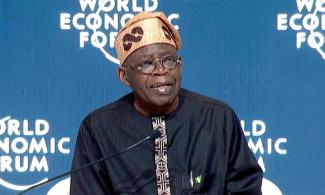Business
Fuel subsidy removal necessary to reset Nigeria’s economy, Tinubu says at World Economic Forum

President Bola Tinubu has disclosed that the removal of petroleum subsidy was necessary to ensure the reset of Nigeria’s economy.
The president maintained that the action became necessary to ensure that the country does not go bankrupt.
He made these remarks while appearing as one of the panelists at the ongoing World Economic Forum in Riyadh, Saudi Arabia this morning.
The World Economic Forum meeting focuses on Global Collaboration, Growth and Energy for Development.
Tinubu justified the petrol subsidy removal, maintaining that it was needed to reset the economy.
“Concerning the question of the subsidy removal, there is no doubt that it was a necessary action for my country not to go bankrupt, to reset the economy and pathway to growth,” Tinubu said.
The Nigerian leader admitted the difficulty associated with his decision to jettison the policy which has allowed Nigerians to purchase petrol at cheaper rates for years but said that he was convinced it was in the best interest of the people.
“It is going to be difficult, but the hallmark of leadership is taking difficult decisions at the time it ought to be taken decisively. That was necessary for the country. Yes, there will be blowback, there is expectation that the difficulty in it will be felt by a greater number of the people, but once I believe it is their interest that is the focus of the government, it is easier to manage and explain the difficulties.
READ ALSO: Fuel scarcity to last for another two weeks – IPMAN
“Along the line, there is a parallel arrangement to really cushion the effect of the subsidy removal on the vulnerable population of the country. We share the pain across the board, we cannot but include those who are vulnerable.
“Luckily, we have a very vibrant youthful population interested in discoveries by themselves and they are highly ready for technology, good education committed to growth. We are able to manage that and partition the economic drawback and the fallout of subsidy removal.”
Tinubu said that the petrol subsidy removal equally engendered accountability, transparency and physical discipline for the country. According to him, it is more important to focus on what direction the country should go.
Tinubu’s petrol subsidy removal was quickly followed by another critical policy, the exchange rate unification, which the president equally defended during the panel session of the WEF in Riyadh.
He said that the management of the nation’s currency by the government was necessary to allow the Naira to compete favourably with other world currencies.
“The currency management was necessary equally to remove the artificial elements of value in our currency. Let our local currency find its level and compete with the rest of the world currency and remove arbitrage, corruption and opaqueness.
“That we did at the same time. That is two engine problems in a very template situation for the government, but we are able to manage that turbulence because we are prepared for inclusivity in governance and rapid communication with the public to really see what is necessary and what you must do.”
Join the conversation
Support Ripples Nigeria, hold up solutions journalism
Balanced, fearless journalism driven by data comes at huge financial costs.
As a media platform, we hold leadership accountable and will not trade the right to press freedom and free speech for a piece of cake.
If you like what we do, and are ready to uphold solutions journalism, kindly donate to the Ripples Nigeria cause.
Your support would help to ensure that citizens and institutions continue to have free access to credible and reliable information for societal development.
























